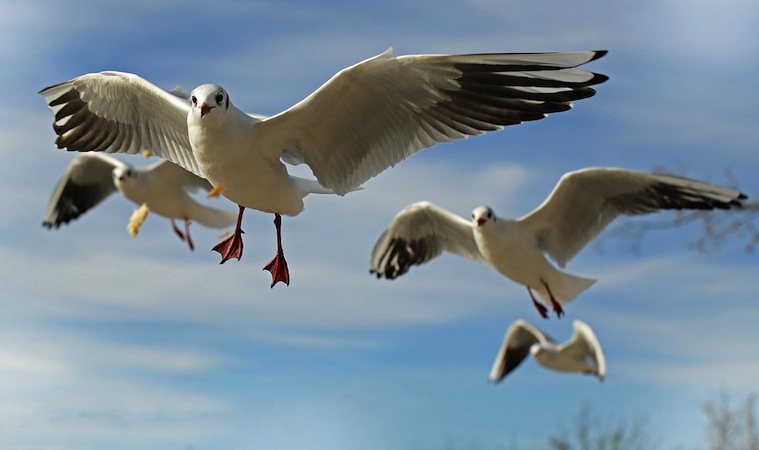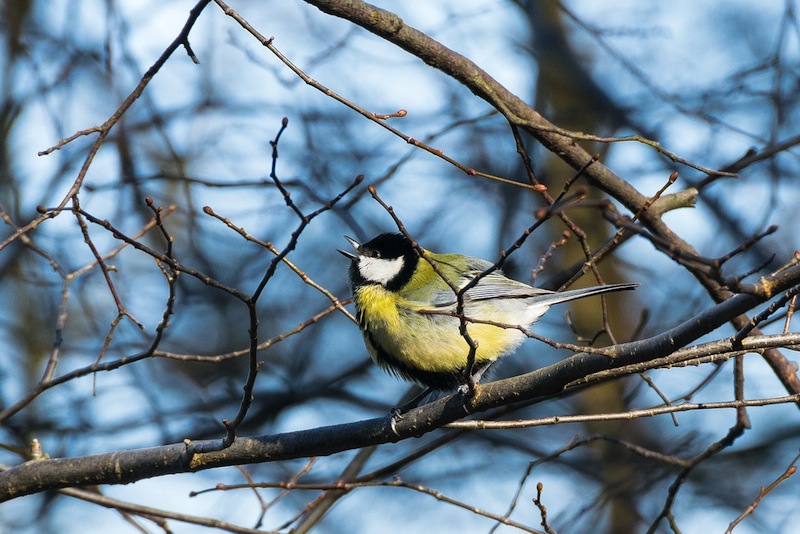Primary Image

Caption
I was sitting on my deck watching the birds feed and snapped this photo.
Photo Credit
Linda L'Esperance
Weather Proverbs About Birds
More Like This
I've seen a large high flying flock of Geese recently in Conn. on a fair sunny day~
I absolutely loved reading this and having it reassert my grandmother's "old wives' tales" in my mind. She always used to tell me that when the birds would get quiet, we were in for a storm or, at the very least, some heavy rain. She also used to tell me that birds would sing more so after a storm to reestablish their territory and because it hypnotized the worms to come to the surface. Lol, I thought that last one was kind of farfetched but, as I learned by reading this almanac, it wasn't so far out in right field as I once believed. Older folks knew so much more about reading nature's signs than we do today because they didn't have our technology, they lived by their wits and observed all those tiny details that we take for granted and overlook. Thank you for sharing this w us and helping me to understand more about our feathered friends..., and that my grandmother was right A LOT more than she was ever wrong lol.
I grew up in Chicago and witnessed a lot of dramatic weather there. During the summer of 2007, the day started out nice and sunny with puffy clouds, then suddenly all of the chimney swifts and swallows left the sky - dropping and blowing down almost like leaves in the Fall. A very strange sight. They took refuge in low lying bushes and shrubs. Less than half an hour later, the sky blackened, and a huge storm roared through that lasted well into the evening hours.
For the last few years I have had a Robin fly into my sliding glass door off my deck. I assume it is the same one every year. It does not let me get close to it but does not fly away at first sight of me. It does this every spring and as the summer progresses will eventually go away.
I have read about how low pressure that comes before s storm causes birds discomfort so the fly lower then they usually do I have also seen birds using tire tracks in the snow to scratch through to the ground and reach food
Birds and other living creatures are probably confused about the weather and don't know how to act. Because of end time weather.
I read that Black Billed and Yellow Billed Cuckoos were called rain Crows because their calling was suppost to mean it will Rain and LOONS WERE CALLED RAIN GOOSE BECUASE IT WAS THOUGHT THEIR CALLING MEANT RAIN and i once heard Western Meadowlark sing in the Rain(Holy Gene Kelly Batman)and i have seen Snowbirds(Oregon Juncos)appear when there is snow coming
My husband and I observed what appeared to be thousands of robins on our southern Maryland property and on our neighbors' properties as well. The robins were on nearby paved streets, on the ground and in the grass, on power lines, and in all of the trees -- everywhere we looked, literally everywhere -- like they were gathering. It was autumn and overcast, but it didn't rain. The silence was almost deafening. Reminded us of Alfreda Hitchcock's "The Birds." We got in our car, went to the store, and returned home. They didn't scatter from starting the engine and moving the car, and they were still there 20 to 30 minutes later when we returned. This happened a second time a few years later, only there were not nearly as many birds. We've lived here for more than 20 years, in this area for better than 65 years, and we've never seen anything like this. What could this have been, and just how unusual is this?
Robin Flocks: What I have read is Canadian Robins MIGRATE each year to the United States during the Autumn; to avoid the harsh Canadians Winters; the Robin flock will spend the winter in the USA; then return to Canada late winter early spring to build their nests and raise their young during the summer;
I've seen these same flocks of Robins; not as many as u did; many times in Connecticut; they like the shrub and tree berries; these are Canadian Robins~
- « Previous
- 1
- 2
- …
- 10
- Next »











Comments